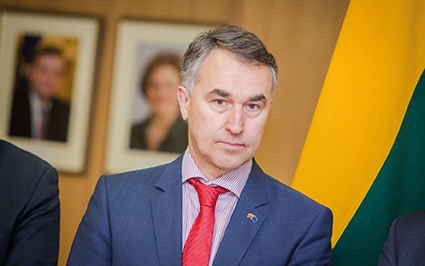Suspension & Fear: MEP Austrevicius on Georgia in the EU
Exclusive Interview
The anniversary of Georgians receiving the visa free regime from the EU is fast approaching, making it as good a time as any to look back and ponder how it turned out. This, especially considering the growing concerns from some countries that they seem to be getting increased asylum seekers from Georgia, with organized crime activities committed by individuals with Georgian citizenship also remaining a nagging problem. And while in its report, the European Commission was largely satisfied regarding its assessment of visa liberalization with Georgia, assuring us that there is no need to worry about the suspension mechanism being triggered, there are also forces in Europe that are showing far less enthusiasm for it. Just recently, one of Germany’s Land Minister’s campaigned for cancelling the visa free regime, citing the above-mentioned sharp increase in asylum seekers. And there’s propaganda too. No doubt these issues, while problematic, will be used in favor of the Kremlin narrative for some time yet. It’s a convoluted business, as Petras Austrevicius, Lithuanian member of the European Parliament, tells GEORGIA TODAY in an exclusive interview, explaining the current EU stance towards Georgia’s handing of visa free.
Many consider that the EU, in football terms, showed us a yellow card and told us to be careful. What do you think? How grievous is the situation?
Part of the puzzle is that Georgia has been asked to comply with much higher standards in different fields: human rights, economic reforms, and legislation, than before. The Association Agreement (AA) that we have between us and Georgia is a very serious and comprehensive document. Implementing the AA means Georgia making many steps towards European standards, the European system, which, I am sure, Georgia would benefit a lot from. But again, it’s not a simultaneous process. It’s doesn’t happen overnight.
Why higher standards than others? Is Georgia a special case?
Well, Georgia is not really a very special case, but we sometimes see in Brussels what I’d describe as an attempt by Georgia to be more selective regarding reforms: ‘one thing I do, another I postpone, then something else I don’t implement at all.’ This selective approach is really bad for Georgia. Georgia politically and economically by many assessments has a chance to be a frontrunner because Ukraine is taken by military aggression and the anti-corruption fight remains unsettled. Moldova is torn by internal disputes between the president and the government; society is divided. Georgia has a good chance to go forward. But it’s not just about paperwork: it should be a real transition and harmonization process. That’s why I call on Georgian politicians not to be selective in implementation of all those things that need to be done.
What are we talking about exactly when we say selective? What would you underline?
We saw on the example of visa liberalization, the visa waiver process. Georgia’s been asked to do and accomplish many things. And we stuck to our word and promise, too, and gave Georgia visa free access. Ultimately, it was a great achievement and recognition for Georgia. People are free to travel to the EU. Had Georgia not done its homework, nothing would have happened. Now we see that economically, economic reforms are advancing, we see step by step positive approach but in political dealings, especially around the rule of law, justice, even the treatment of some opposition figures, there’s an attempt to present it as something local, like telling us - this is our local issue, this is not the business of the EU, we can deal with it according to local rules and traditions. I think it can be dangerous if that point of view prevails. I don’t want to present it as a great problem for the time of being, but if it becomes a systematic approach, Georgia might start making steps backwards.
Are we in danger of the EU seriously considering launching the suspension mechanism?
This automatic suspension mechanism was first introduced towards Ukraine and Georgia. I see it as a potential risk. It might be applied if the figures of those who want to stay in the EU beyond the visa allowance increases. So far, what we have is a preliminary assessment on the ground from the first half of 2017. The numbers are not so dramatic: they don’t exceed even 5%. Some people stay in the EU, I guess mainly younger ones, trying to get jobs, looking for new opportunities. I think social-economic reasoning is a major one; jobs are better in the EU. But there’s a certain tolerance level to consider, here: if those figures start to rise, or we hear more statements and information about the criminal activities of Georgian citizens, then of course, some precautionary measures might be taken. And the worst part of it all is that good people will suffer, because some countries might try to refuse Georgians travelling with no visa. I see it as a risk, but I don’t want to highlight it as risk of the present and I hope we’ll not see a need to apply the suspension mechanism. Ultimately, the Georgian authorities need to be very cooperative.
The most skeptic of our society point out that while there are complaints about Georgians, millions of Syrians are being allowed into the EU. How would you answer these skeptics?
First, you can’t compare Syria and Georgia. Georgians are not refugees; there’s no ongoing war or conflict in Georgia. We consider Georgia a stable country. Georgians are entitled to travel with no visa and it’s a high recognition of the state of our relationship. They are not refugees. They are people of a third country with whom we want to establish a strategic and longstanding partnership.
Vazha Tavberidze












